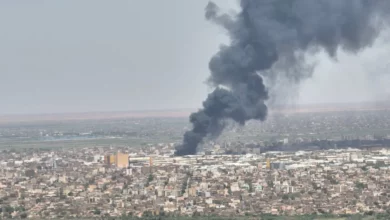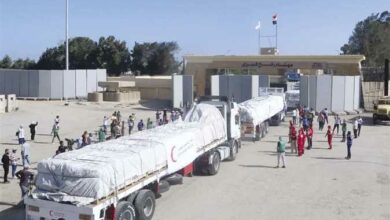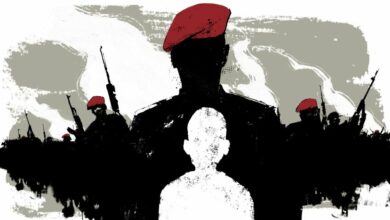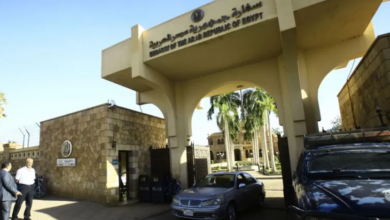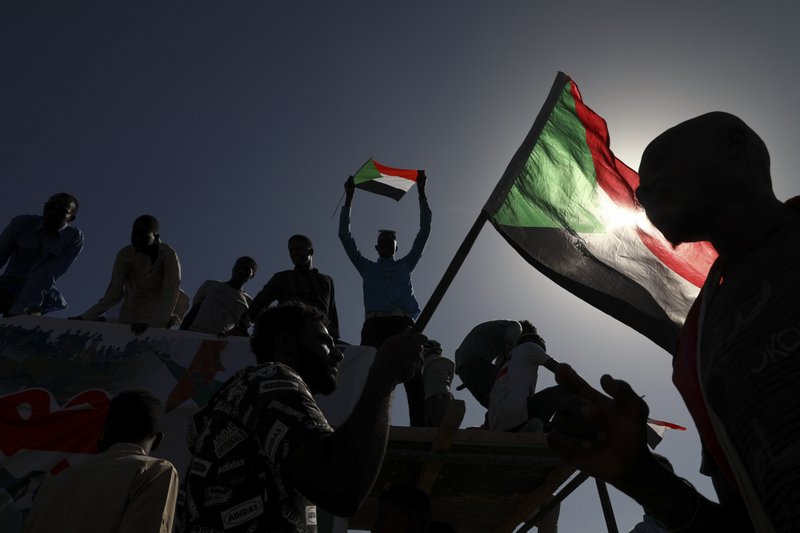
BERLIN (AP) — Western and Arab countries pledged a total US$1.8 billion in aid to Sudan on Thursday to help the struggling African nation a year after pro-democracy protesters forced the removal of the country’s longtime autocratic ruler, Omar al-Bashir.
The pledges from 40 countries, including an additional $400 million in grants from the World Bank, came during a video conference co-hosted by Germany, marking the formal launch of the international community’s financial support for Sudan’s democratic transition after three decades of punitive sanctions and isolation under al-Bashir.
Germany’s foreign minister, Heiko Maas, said that the conference was just the start of helping Sudan and that donors would reconvene early next year.
“We are extremely delighted, satisfied and happy with this response,” said Sudanese Prime Minister Abdalla Hamdok, a former economist with the United Nations.
Although the conference presented an unprecedented amount of international support, pledges fell far short of the US eight billion dollars Hamdok had previously said Sudan will need to rescue its plunging economy.
Sudan’s interim government has been grappling with an economic crisis since it took office last year while also navigating a treacherous transition to civilian rule. The coronavirus pandemic has exacerbated the economic despair, throwing millions of laborers out of work.
Drastic shortages of basic goods nationwide have generated deep frustration, forcing people to line up for hours to buy bread or get fuel. Many of Thursday’s pledges will be used to fund an ambitious $1.9 billion cash transfer program to Sudan’s neediest families, around 80 percent of the population, over the course of two years.
“This is about helping the government to build political capital domestically so that it can show civilians that they’re capable of responding to their needs and demands,” said Jonas Horner, senior Sudan analyst at the International Crisis Group.
Two-thirds of the country’s more than 40 million people live in poverty, and the government has inherited a debt of 60 billion dollars and a rapid inflation rate. The nation’s currency, the Sudanese pound, is trading on the black market for double its official rate of 55 pounds to the dollar.
Acting USAID administrator John Barsa said that the US would give $356.2 million toward development aid and democratic transition programs. The funds included a nearly tenfold increase in development assistance compared to 2019, he said.
The European Union pledged 312 million euros ($350 million), while Germany said it would give 150 million euros ($168 million). France pledged a total of 100 million euros, or about $112 million — a mixture of previously announced aid and newly bolstered assistance. The United Kingdom also gave 166 million euros, more than $186 million.
The United Arab Emirates, which last year pledged a three billion dollar joint aid package with Saudi Arabia, announced $50 million in new aid for an investment initiative Thursday, while Saudi Arabia donated just $10 million. The stark reduction suggested that the wealthy Gulf Arab monarchies, known for bankrolling military rulers in the region, including al-Bashir, may be more reluctant to prop up the country’s civilian leaders.
It was not immediately clear how much of the aid announced in the conference was new.
Sudan’s government faces steep challenges to transforming its economic system and meeting the demands of protesters who ousted al-Bashir last year, spurred by the soaring prices of staple goods and rising youth unemployment. The government is on the hook for billions of dollars in interest and principal repayments, which has crippled its economic activity and hindered its access to funds from international financial institutions.
David Malpass, president of the World Bank Group, said the global body has worked to find innovative ways to circumvent these financial restrictions and will establish a multi-donor trust fund to channel Thursday’s pledges as it works with the government to clear its massive debt.
On Wednesday, the International Monetary Fund announced it had reached a preliminary deal with Sudanese authorities to pave the way for debt reduction and economic stabilization as the country reels from the financial fallout of the pandemic. IMF assistance is contingent on significant economic reforms, including painful measures that will slash subsidies for basic goods to generate revenue for social programs.
Kristalina Georgieva, IMF managing director, stressed the need for the government to remove fuel subsidies, which she said consumed 10.5 percent of Sudanese gross domestic product. She appealed for $1.5-2 billion in aid to plug Sudan’s financial gap, saying that without donors’ help, “inflation cannot be put under control and these reforms cannot have legs.”
Sudanese Finance Minister Ibrahim Elbadawi told the conference that the government’s proposed reforms include increasing budget transparency, investing in long-neglected provinces, streamlining tax exemptions and accelerating the work of an anti-corruption commission, which has so far confiscated property from al-Bashir’s relatives.
Beyond the country’s arrears to financial institutions, another major economic stumbling block for Sudan is its designation as a state sponsor of terrorism by the US State Department because of the country’s former support for radical Islamic extremist groups. Osama bin Laden lived in Sudan as a guest of al-Bashir’s government in the 1990s, and in 1998, his al-Qaida network blew up US Embassies in Kenya and Tanzania, killing 224 people.
Barsa said that the US could not give a timeline for dropping Sudan from the blacklist, but that a key step is settling punitive damages to victims’ families. Sudan’s foreign ministry said Thursday it had come very close to reaching “a satisfactory settlement.”
The collapse of Sudan’s economy poses an existential threat for its political transition. The uprising that toppled al-Bashir in April 2019 led to a power-sharing deal between civilian appointees and the military. Pro-democracy activists have said that the military leaders have stalled in handing over power to civilian leaders.
While the conference represents a vote of confidence in Sudan’s transitional government, optimism has been tempered by the country’s ongoing power struggle.
“There’s a recognition that there’s a wholesale change at the top of Sudan,” said Horner, the Sudan expert. “But the military is still ascendant in power, so that limits the sort of reforms the government can take […] and their ability to gain the trust of people in the street.”
___
Associated Press writer Frank Jordans reported this story in Berlin and AP writer Isabel Debre reported from Los Angeles.
Image: In this Nov. 19, 2019 file photo, people gather as they celebrate first anniversary of mass protests that led to the ouster of former president and longtime autocrat Omar al-Bashir in Khartoum, Sudan. On Thursday, June 25, 2020, the United States, Germany and France have pledged hundreds of millions in aid to Sudan. The funds are intended to help the struggling African nation a year after pro-democracy protesters forced the removal of its long-time autocratic ruler, Omar al-Bashir. (AP Photo, File)

